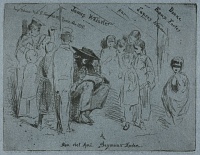Etchings Institutions search term: metropolitan museum
The Title Page for 'Douze Eaux Fortes d'après Nature' | ||
| Number: | 22 | |
| Date: | 1858 | |
| Medium: | etching | |
| Size: | 112 x 147 mm | |
| Signed: | no | |
| Inscribed: | 'Douze / Eaux Fortes / d'apres Nature - / par James. Whistler. / Imp. Delatre. Rue St. Jacques. 171. Paris. Nov. 1858 -' and 'Imp. Delatre. Rue St. Jacques. 171. Paris. Nov. 1858 -' at top; 'A / Mon viel Ami Seymour Haden.' at bottom. | |
| Set/Publication: | 'French Set', 1858 | |
| No. of States: | 1 | |
| Known impressions: | 56 | |
| Catalogues: | K.25; M.25; T.1; W.20 | |
| Impressions taken from this plate (56) | ||
KEYWORD
TITLE
'Douze Eaux Fortes d'après Nature' (1858, Whistler). 2
'The Title' (1874, Ralph Thomas, Jr (1840-1876)). 3
'The Title to the French Set' (1886, Frederick Wedmore (1844-1921)). 4
'Portrait (on blue cover)' (1887, Whistler). 5
'Title Page' (1889, Whistler). 6
'Delannoy, Sketching' (1909, Howard Mansfield (1849-1938)). 7
The Title Page for 'Douze Eaux Fortes d'après Nature' incorporates Whistler's 'Title Page' and the text on the copper plate.
In one sense Mansfield was correct in his title because the artist in the scene is based on Whistler's drawings of Ernest Delannoy (d. 1860/1870), but this is clearly not the title by which Whistler knew it.
2: Etched on copper plate.
3: Thomas 1874 (cat. no. 1).
4: Wedmore 1886 A (cat. no. 20).
5: Whistler to W. C. Angus, 9 May 1887, GUW #13098.
6: List, 18 July 1889, GUW #13235.
7: Mansfield 1909 (cat. no. 25).
DESCRIPTION
SITTER
SITE
DISCUSSION
11: MacDonald 1995 (cat. nos. 270-271).
12: MacDonald 1995 (cat. no. 271).

